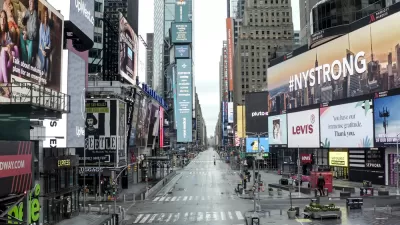Data from millions of cellphone customers will be used to locate and alert individuals who may have come into contact with people carrying the virus.

"Prime Minister Benjamin Netanyahu of Israel has authorized the country’s internal security agency to tap into a vast and previously undisclosed trove of cellphone data to retrace the movements of people who have contracted the coronavirus and identify others who should be quarantined because their paths crossed," report David M. Halbfinger, Isabel Kershner, and Ronen Bergman.
The plan is to use geolocation data from cellphones to identify people who may have been exposed to the virus and send text messages telling them to isolate themselves. The data is regularly collected for counterterrorism purposes, but using it for public health efforts is new.
Halbfinger, Kershner, and Bergman go into more detail about the political situation in Israel and the debate around privacy concerns. "It is the existence of the cellphone metadata trove and its use to track coronavirus patients and carriers that privacy advocates say poses the greatest test of Israeli democracy at an extraordinarily fragile moment," they say.
[Update: new reports reveal that cellphone companies in numerous countries around the world are sharing data with health officials. See articles published by the The Verge and Reuters for more.]
FULL STORY: To Track Coronavirus, Israel Moves to Tap Secret Trove of Cellphone Data

Rethinking Redlining
For decades we have blamed 100-year-old maps for the patterns of spatial racial inequity that persist in American cities today. An esteemed researcher says: we’ve got it all wrong.

Planetizen Federal Action Tracker
A weekly monitor of how Trump’s orders and actions are impacting planners and planning in America.

California High-Speed Rail's Plan to Right Itself
The railroad's new CEO thinks he can get the project back on track. The stars will need to align this summer.

Santa Clara County Dedicates Over $28M to Affordable Housing
The county is funding over 600 new affordable housing units via revenue from a 2016 bond measure.

Why a Failed ‘Smart City’ Is Still Relevant
A Google-backed proposal to turn an underused section of Toronto waterfront into a tech hub holds relevant lessons about privacy and data.

When Sears Pioneered Modular Housing
Kit homes sold in catalogs like Sears and Montgomery Ward made homeownership affordable for midcentury Americans.
Urban Design for Planners 1: Software Tools
This six-course series explores essential urban design concepts using open source software and equips planners with the tools they need to participate fully in the urban design process.
Planning for Universal Design
Learn the tools for implementing Universal Design in planning regulations.
City of Camden Redevelopment Agency
City of Astoria
Transportation Research & Education Center (TREC) at Portland State University
Regional Transportation Commission of Southern Nevada
Toledo-Lucas County Plan Commissions





























